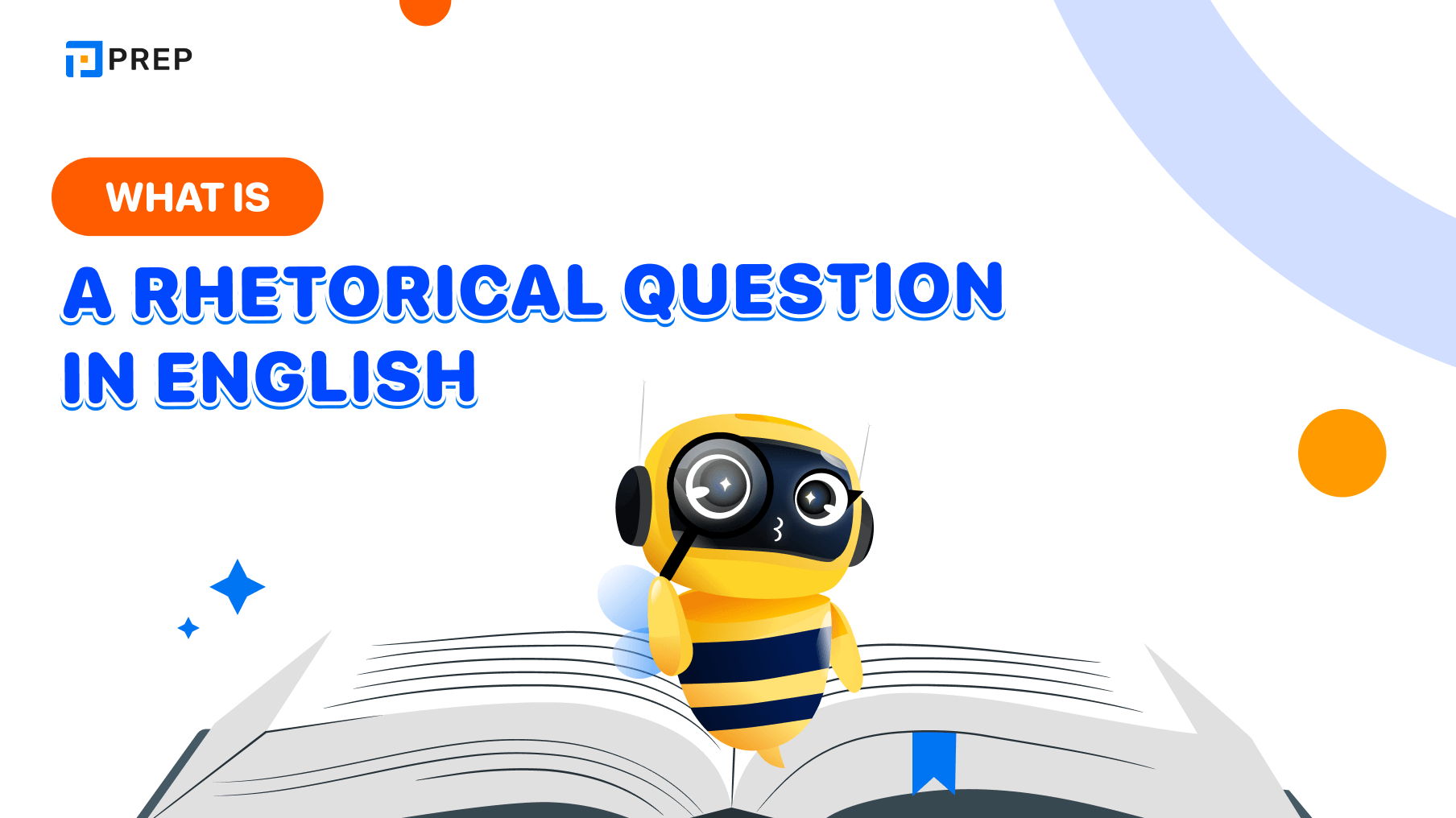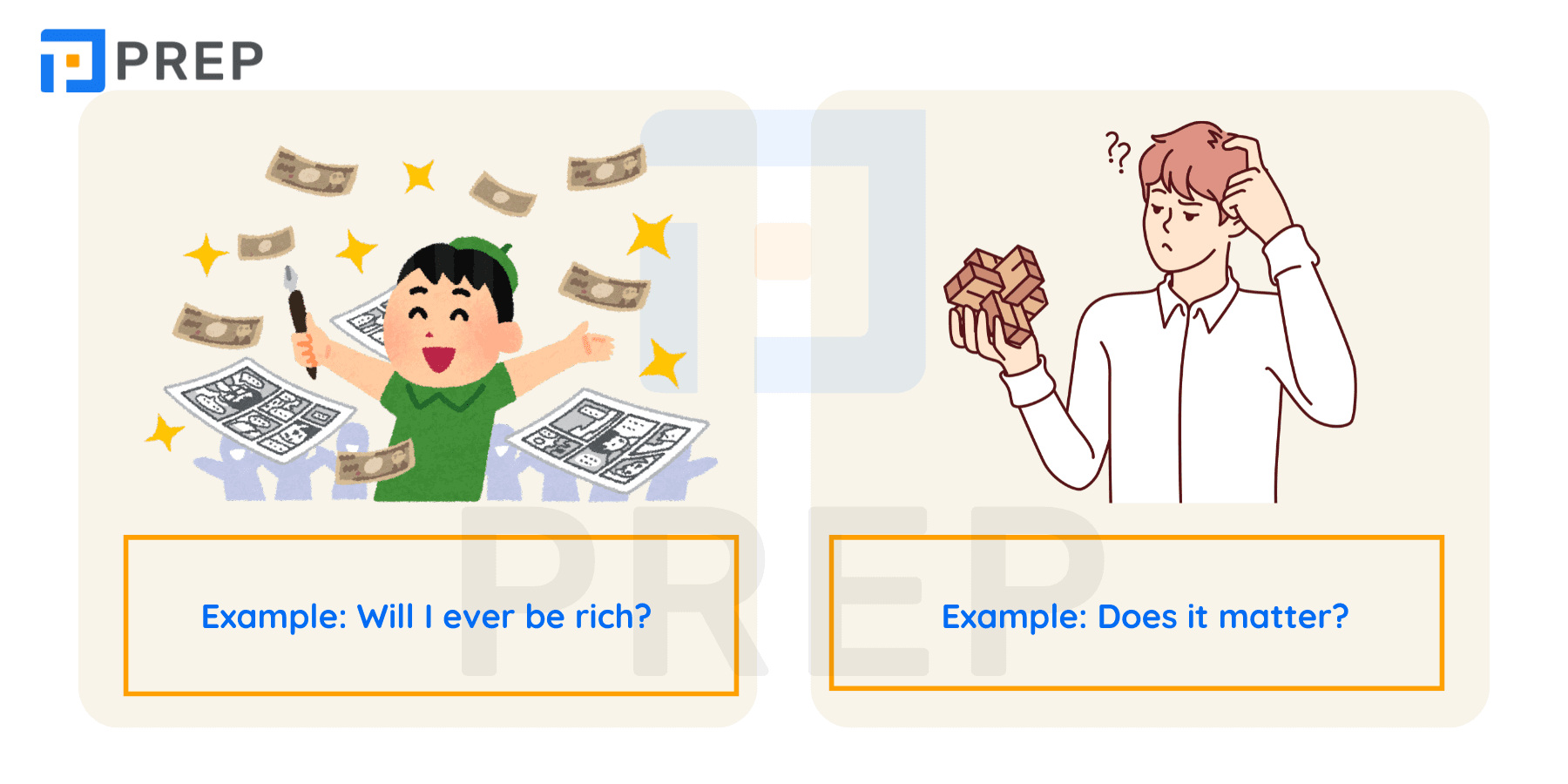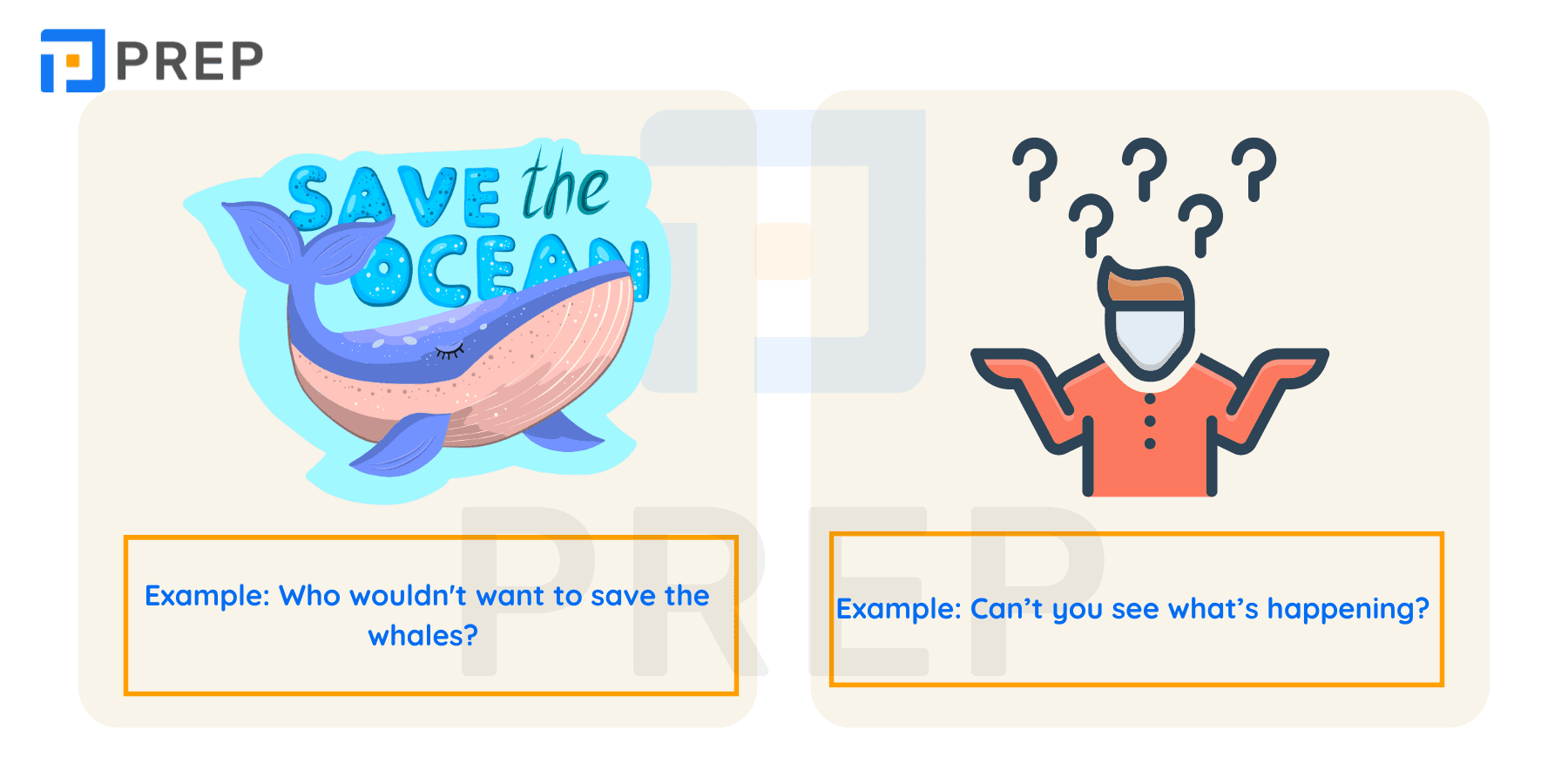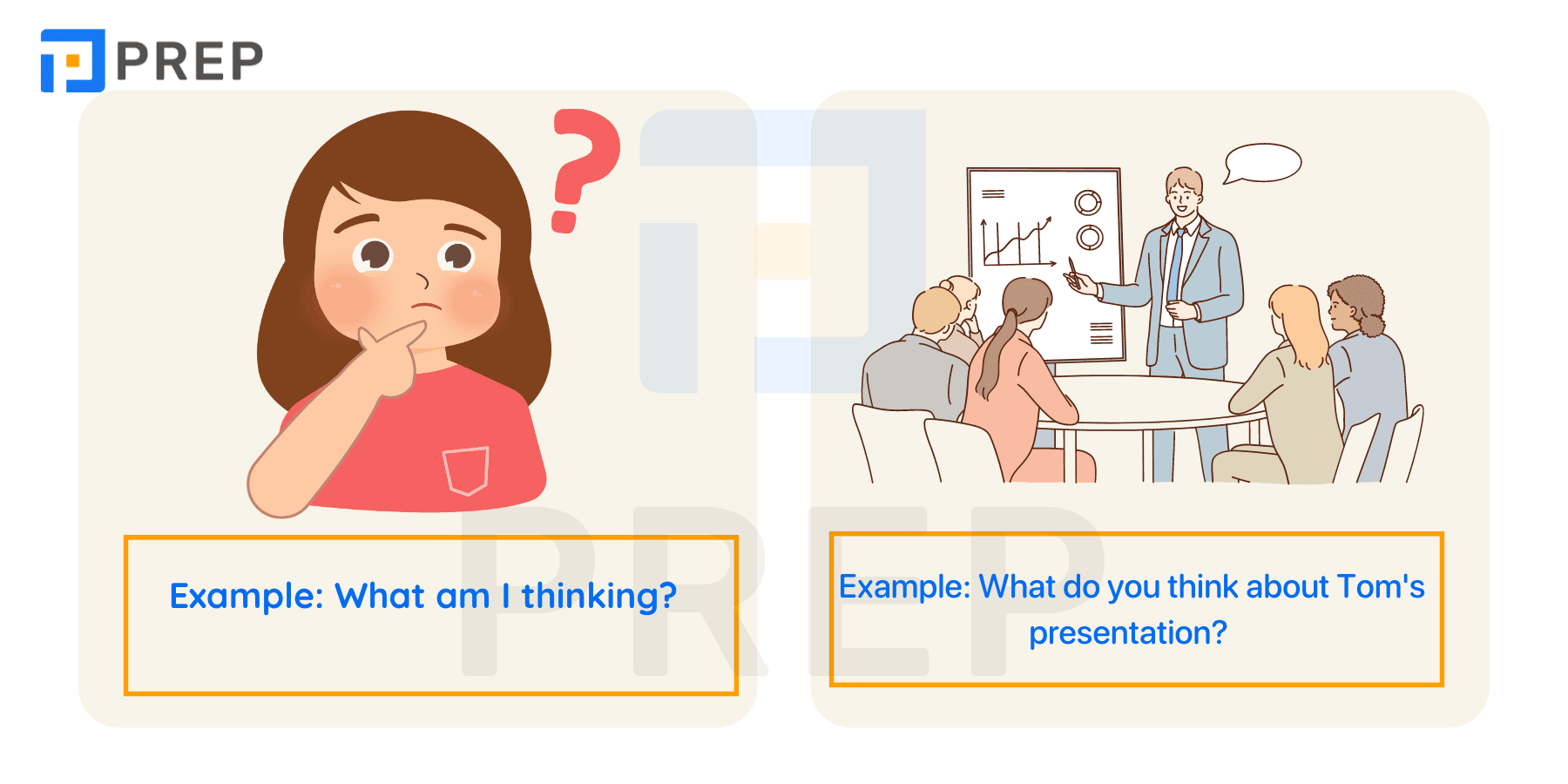Search blog
A rhetorical question in English: Understanding the definition, classifications, and proper usage
What is a rhetorical question in English? How can we correctly utilize this type of questioning in communication? Let's learn about the definition, classifications, and proper usage of the three main rhetorical question types in English below!

I. What is a rhetorical question in English?
Rhetorical questions are a form of questioning in the form of an interrogative statement. Unlike regular questioning which solicits a response, rhetorical questions are used to express a viewpoint (reminder, advice, persuasion, rejection, emphasis, etc.) rather than asking for the listener to provide an answer. For example:
- Will I ever be rich?
- Does it matter?

II. Classifications of rhetorical questions in English
How many types of rhetorical questions are there in English? Let's comprehensively explore the classifications with PREP!
1. Questions inviting immediate reply (Anthypophora)
Anthypophora refers to a rhetorical question type in English that invites an instant response. For example:
- A: Who is impacted by pollution?
- B: Everyone.
- A: Why should we believe in you?
- B: I'll give you three good reasons...
2. Rhetorical questions for admonition, advice, or rebuke (Epiplexis)
Epiplexis refers to a type of English rhetorical question used for admonishing, advising or rebuking others rather than soliciting a response. For example:
- Who wouldn't want to save the whales?
- Can’t you see what’s happening?
3. Rhetorical questions to evoke strong emotions (Erotesis)
Erotesis describes rhetorical questions crafted in English to provoke a desired strong reaction of agreement or dismissal. However, this question type often pre-supposes the opposite response for dramatic persuasive effect. For example:
- Do you want to lose?
- Are you against freedom?

III. When are rhetorical questions used?
Rhetorical questions in English can be applied in a wide variety of fields. Below, PREP has outlined 3 main contexts where rhetorical questions are commonly used:
1. In literature
Rhetorical questioning finds rich application in literature. To take one famous example, in Shakespeare's "Romeo and Juliet", Juliet delivers two rhetorical inquiries that further the dramatic tension without requiring overt response:
- What’s Montague?
- What's in a name?
In the poem "Ode to a Nightingale", John Keats also crafted several rhetorical questions that achieve subtle mockery and emphasis, such as:
- For what can war but endless war still breed?
2. In presentations and speeches
When addressing an audience, deploying rhetorical questions proves an artful method to emphasize viewpoints and maintain engagement. For example:
- In 1980, United States President Ronald Reagan subtly employed admonishing rhetorical inquiry to say: “Can anyone look at the record of this administration and say, “Well done?”
- At the United Nations, in Emma Watson's speech addressing gender equality issues, she insightfully posed the rhetorical question: "Why has the word become such an uncomfortable one?". You can watch this video below to better understand the context of her rhetorical question:
3. In daily life
Beyond formal applications, rhetorical questions also prove adept conversation tools for daily life:
- Used to refer to something that is too obvious. For example: Is the sky blue?
- Used to emphasize a positive point of view. For example: Why not?
IV. Distinguishing rhetorical questions and interrogative questions

So what are the differences between rhetorical questions and interrogative questions? How is each type of question used? Let's explore these together below!
Rhetorical questions | Interrogative questions | |
Definition | Rhetorical questions are a form of questioning in the form of an interrogative statement and are used to express a viewpoint (reminder, advice, persuasion, rejection, emphasis, etc.) rather than asking for the listener to provide an answer. | Interrogatives are conventional questions typically seeking concrete responses through clear and direct inquiry. |
Example | What am I thinking? | A: What do you think about Tom's presentation? B: I think it is very boring. |
V. English rhetorical questions exercises with answers
Let’s practice the two exercises on rhetorical questions in English below!
1. Exercises
Exercise 1: Are they rhetorical questions? Tick ✅ in the corresponding column
Question | Rhetorical question | Interrogative question |
Example: Don’t you want to get somewhere in life? | ✅ | |
Example: A: I love America. Do you want to live there? B: Absolutely yes. | ✅ | |
Who cares? | ||
Did Janet call? | ||
Is Tim your brother? | ||
How should I know? |
Exercise 2: Match the English rhetorical questions with suitable contexts.
Context | Rhetorical question |
1. A known bully becomes the victim of an even bigger bully. | A. What planet is she from? |
2. Someone asks you if they can borrow money many times. | B. Does he see the consequences? |
3. Your brother never remembers to shut the door behind him when he goes outside. | C. Who would want to buy that? |
4. You see a really ugly coat in a store window. | D. Why does he still do that? |
5. A new girl in class thinks all homework is optional. | E. Do I look like an ATM? |
2. Answer
Exercise 1:
Question | Rhetorical question | Interrogative question |
Who cares? | ✅ | |
Did Janet call? | ✅ | |
Is Tim your brother? | ✅ | |
How should I know? | ✅ |
Exercise 2:
- B
- E
- D
- C
- A
PREP hopes that this article on English rhetorical questions has helped you understand what an English rhetorical question is, its recognition signs, and the three main rhetorical question types. Wishing you to gain more useful English knowledge!

Comment
Search blog
Đăng ký tư vấn lộ trình học
Bạn hãy để lại thông tin, Prep sẽ liên hệ tư vấn cho mình ngay nha!
